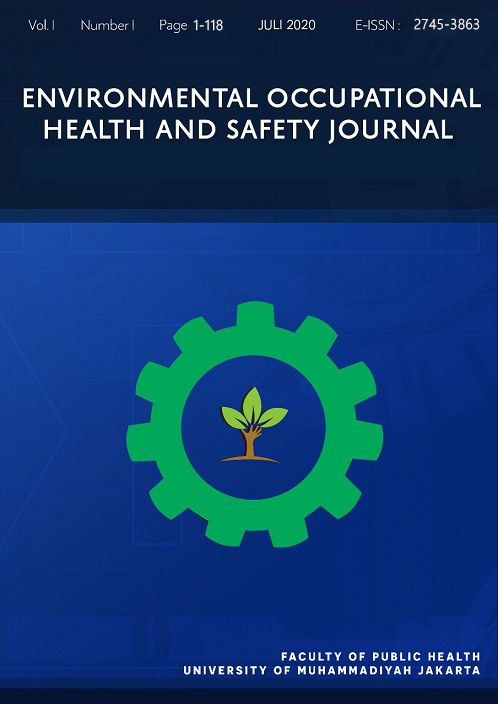Gambaran Umum Pengelolaan Limbah Bahan Berbahaya dan Beracun (B3)di Rumah Sakit Umum Daerah Tebet Tahun 2018
Main Article Content
Abstract
Article Details
References
Asmarhany, Chandra. 2014. Pengelolaan Limbah Medis Padat di Rumah Sakit Umum Daerah Kelet Kabupaten Jepara, Skripsi: Jurusan Ilmu Kesehatan Masyarakat
Keputusan Menteri Kesehatan Republik Indonesia Nomor 1204/MENKES/SK/X/2004 tentang Persyaratan Kesehatan Lingkungan Rumah Sakit: Departemen Kesehatan Republik Indonesia
Mustika, Dewi, dkk. 2014. Analisis Pengelolaan Sampah Medis Pelayanan Kesehatan Praktik Bidan Swasta Di Kota Banjarbaru: Jurnal Kesehatan, EnviroScienteae 10 : 118-123. ISSN 1978-8096
Peraturan Menteri Lingkungan Hidup dan Kehutanan Republik Indonesia Nomor P.56/Menlhk Setjen/2015 Tentang Tata Cara Dan Persyaratan Teknis Pengelolaan Limbah B3 Dari Fasyankes
Pruss, Annette, dkk. 2005. Pengelolaan Aman Limbah Layanan Kesehatan. Jakarta: EGC
Purcell, John. 2005. Waste Management in Hospitals. Irlandia: Departement Of Health and Children. Diakses 30 Mei 2018. http://www.audgen.gov.ie/documents/vfmreports/49_Waste_ Management _ in_Hospitals.pdf
Rahno, Dionisius. 2015. Pengelolaan Limbah Medis Padat Di Puskesmas Borong Kabupaten Manggarai Timur Propinsi Nusa Tenggara Timur: Jurnal Kesehatan, J-PAL, Vol. 6, No. 1. ISSN: 2087-3522
Rosmawaty, Winnie. 2013. Gambaran Pengelolaan Limbah Medis Tajam Di Rumah Sakit Umum Daerah (RSUD) Kabupaten Bekasi Tahun 2013 Dibandingkan Dengan Kepmenkes No. 1204/ Menkes/ Sk/ X/ 2004 Dan Western Regional Hospitals 2012, Skripsi: Program Studi Kesehatan Masyarakat
Ronald T, Jootje M.L. Umboh, W. B. S. J. (2018) ‘Pengelolaan Limbah Medis Padat Bahan Berbahaya Beracun (B3) di Rumah Sakit Umum Daerah (RSUD) Piru Kabupaten Seram Bagian Barat, Provinsi Maluku pada Tahun 2018’, 7(5), pp. 1–8. Available at: https://ejournal.unsrat.ac.id/index.php/kesmas/article/viewFile/22333/22019.
World Health Organization. World Health Report; 2003
